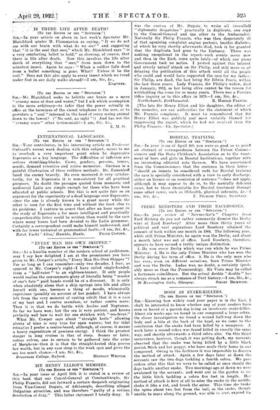INTERNATIONAL LANGUAGES.
[To THE EDITOR OF THE " SPECTATOR.") Sts,—Your contributor, in his interesting article on Professor CuSrard's recent work dealing with this subject, seems to me to overlook a very important point when he deprecates Esperanto as a key language. The difficulties of inflexion aro serious stumbling-blocks. Cases, genders, persons, tenses, moods, demand retentive and active memories. German is a painful illustration of these ruthless methods. Dr. Zamenhoft faced the enemy bravely. He even mastered it very satisfac- torily, for in Esperanto it is non-existent for all practical purposes. No doubt the passages quoted from monastic and mediaeval Latin are simple enough for those who have been educated at public schools. But this is not quite fair as an argument for the superiority of a dead language over Esperanto, since the one is already known to a great many while the other is seen for the first time and without the least clue to its problems. I venture to assert that after an hour spent in the study of Esperanto a far more intelligent and practically comprehensible letter could be written than would be the case where many hours had been devoted to the Latin grammar. Certainly a correspondent could make himself understood, and with far fewer technical or grammatical faults.—I am, Sir, &c., Retch Yacht Ailsa,' Ramble, Hants. FRANK COWPER.


































 Previous page
Previous page